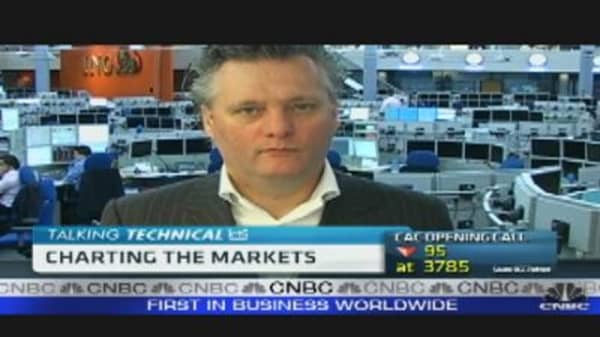Stocks pared the worst losses of the day, although remain sharply lower, as the worsening nuclear crisis in Japan prompted investors to sell stocks across the globe and move into safer investments.
The Dow Jones Industrial Average sank more than 200 points after dropping 51 pointson Monday.
All Dow components tumbled, led by Intel , General Electric and 3M .
The S&P 500 and the tech-heavy Nasdaq both slumped at least 1.75 percent, with the Nasdaq falling below the level where it started the year at the beginning of the session. The CBOE Volatility Index, widely considered the best gauge of fear in the market, soared more than 14 percent, to above 24, after skyrocketing more than 25 percent at the start of trading.
All key S&P 500 sectors fell, led by technology, utilities and industrials.
The crisis in Japan deepened Tuesday evening as a magnitude 6.2 earthquake hit the eastern part of the country, 72 miles from Tokyo, where buildings swayed. Power plants were still operating in the area, according to Tepco, while Kyodo reported there was no threat of a tsunami.
"One word to describe traders on the floor: Nervous," said Todd Schoenberger, managing director at LandColt Trading. "Traders figured a major geopolitical event would be the catalyst for a sharp sell-off in equities—nobody figured a natural disaster would be the trigger. Add in both Japan and the problems in the Middle East, plus the talk about an overbought market, and we're headed for ugly times in equities."
As stocks plunged, jittery investors moved into Treasurys. The yield on the 10-year Treasury note fell to 3.27 percent.
"I’m not surprsised by the pressure on the equity markets at all," said Bob Andres, chief investment officer at Merion Wealth Partners. "The fact that equities are overvalued makes them very vulnerable to an outside situation like we’re seeing."
The aftermath of the quake will have an effect on the global economy, "at a point in time where I think the global economy is about to slow down," Andres said. Even without a disaster of this magnitude, Andres had expected stock prices to fall from their lofty levels, and for bond yields to remain at current levels or move lower before the year ends.
"There was no bond bubble," Andres said. "I would argue PE (price-to-earnings) ratios are too high, I would argue that the economy, while we’ve certainly seen some pluses, I believe it’s all been built on government largesse and we’re going to see an end of that shortly."
To ease the opening of trading, the New York Stock Exchange and NYSE Amex Cash Markets on Tuesday invoked a rule, known as "Rule 48," that requires traders to suspend price indications that determine the bottom price for stocks at the open. Bypassing the requirement helps speed the beginning of trading.
Tokyo’s stock market plunged more than 14 percent at one point Tuesday after the quake-hit Fukushima nuclear power plantwas hit by two explosions. A significant rise in radioactive levels added to the anxiety over last week’s disaster, with warnings that winds with radiation could reach Tokyo later in the day.
Japan’s economics minister tried to calm investors at a press conference Tuesday, saying there was no reason to close Tokyo markets. (Click here for more news on the disaster in Japan).
The uncertainty surrounding the nuclear crisis was making investors particularly risk-averse Tuesday, Michael Taylor, senior economist at Lombard Street Research, told CNBC.
“Like the crisis in the Middle East, it’s another one of those issues that could hit the global economy. Japan is still the world’s third-largest economy,” he said.
In addition to the crisis in Japan, investors were absorbing news out of the Middle East. Bahrain declared a state of emergency amid news that troops were sent into the country from Saudia Arabia to quell protests. A soldier from Saudia Arabia was reportedly killed by protesters. (Click here for more on the crisis in the Middle East and North Africa.)
London Brent crude sank more than 4 percent to below $109 a barrel, while U.S. light sweet crude fell more than 3 percent below $98 a barrel, amid expectations that global demand for oil will slow as a result of the crisis in Japan.
The International Energy Agency trimmed its forcast for global oil demand on Tuesday to 1.44 million barrels per day, according to Reuters.
Utilities and stocks active in the nuclear sector fell sharply, including Exelon , the Southern Company , and Entergy .
GE was down sharply for a second day because of the company's connections to the Japanese nuclear industry. Cameco , a uranium producer, also sank.
Fears about the future of the nuclear industry gave a boost to stocks of renewable energy companies, led by SunPower ,Trina Solar and First Solar , all of which gained more than 3 percent.



